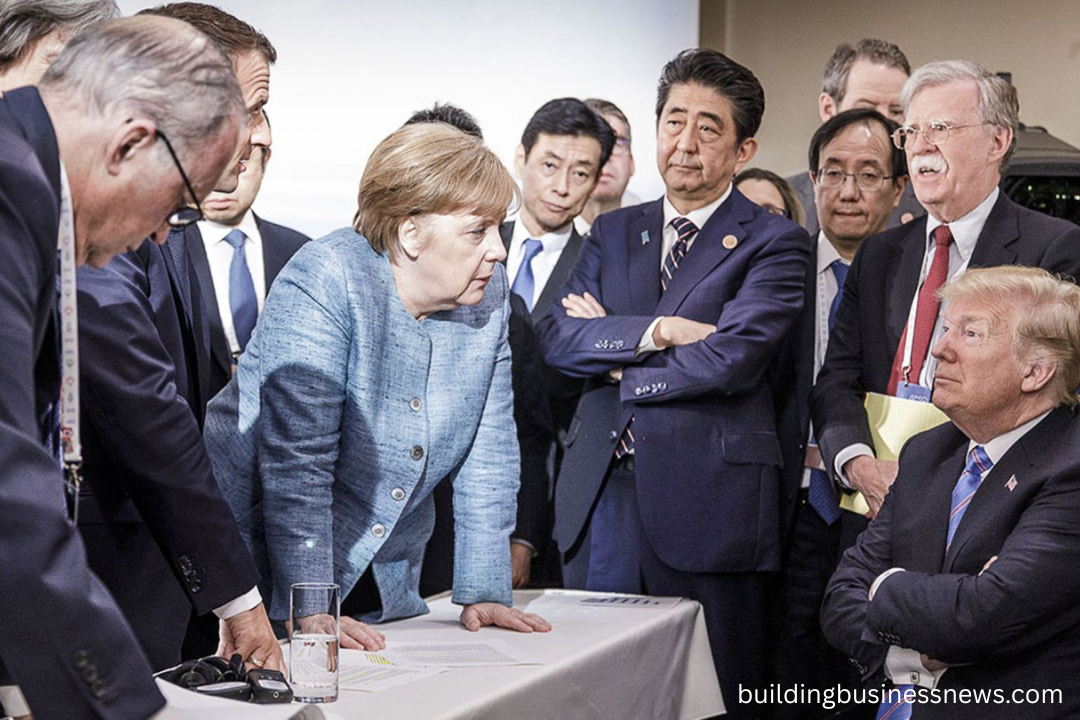G7 Leaders gathered for high-stakes talks aimed at resolving escalating trade tensions, with U.S. President Donald Trump facing sharp criticism over his administration’s trade policies. The summit, held amid growing economic uncertainty, was marked by straightforward exchanges between long-standing allies.
G7 Leaders from Canada, France, Germany, Italy, Japan, the United Kingdom, and the European Union voiced concerns over rising tariffs, disrupted supply chains, and weakened global trade cooperation. These issues dominated discussions and underscored the fractures emerging within the traditionally united G7 bloc.
Tariff Policies Spark Division Among G7 Leaders
Central to the debate were the U.S. tariffs imposed on steel and aluminum imports, as well as threats of additional levies on automobiles and consumer goods. G7 Leaders argued that such unilateral actions undermine global economic stability and threaten decades of multilateral progress.
While President Trump defended the tariffs as necessary for protecting American industries, other G7 Leaders pushed back, citing the economic harm inflicted on their own manufacturing sectors and warning of retaliatory measures.
The talks revealed deep divisions over how international trade should be governed, with G7 Leaders calling for renewed commitment to World Trade Organization (WTO) principles.
G7 Leaders Urge Multilateral Solutions
During closed-door sessions, G7 Leaders urged the United States to engage in multilateral discussions rather than pursuing aggressive bilateral trade actions. They emphasized that cooperation, not confrontation, is key to resolving imbalances in global trade.
Canadian Prime Minister Justin Trudeau stated that the G7 must present a united front in addressing challenges such as market access, intellectual property protection, and digital trade. Other G7 Leaders echoed these sentiments, stressing the importance of reforming trade rules within an agreed international framework.
The appeal to multilateralism reflects the broader fear among G7 Leaders that continued U.S. defiance could unravel decades of economic diplomacy.
U.S. Isolation Emerges at the G7 Summit
The summit made it clear that the United States stood increasingly alone on trade issues. While G7 Leaders maintained polite diplomatic tones publicly, behind the scenes there was frustration over the unpredictability of American trade policy.
European leaders, including French President Emmanuel Macron and German Chancellor Angela Merkel, emphasized that protectionist measures hurt both consumers and businesses. They urged President Trump to consider the long-term implications of ongoing trade skirmishes on global supply chains and economic partnerships.
As tensions mounted, some G7 Leaders hinted at bypassing the United States in future trade agreements, raising concerns about a potential realignment of global economic alliances.
Economic Impact of U.S. Trade Disputes Discussed
G7 Leaders also examined the tangible economic consequences of current trade disputes. Analysts presented data suggesting that increased tariffs have led to higher consumer prices, decreased export volumes, and slowed manufacturing growth across multiple economies.
The International Monetary Fund (IMF) warned that continued trade tensions could reduce global GDP growth by as much as 0.5%. G7 Leaders acknowledged that businesses are delaying investment decisions due to uncertainty, which in turn hampers job creation and innovation.
By addressing these impacts, G7 Leaders hoped to persuade the Trump administration of the urgent need to ease hostilities and restore market confidence.
Global Markets Watch G7 Leaders’ Moves Closely
Financial markets paid close attention to the outcomes of the G7 summit, with investors gauging the likelihood of trade resolution. Stock indexes across Europe, North America, and Asia showed volatility as G7 Leaders exchanged statements during the multi-day event.
The Dow Jones Industrial Average and FTSE 100 experienced swings based on speculation surrounding whether Trump would agree to compromise. Currency markets also reacted, especially with the euro and Canadian dollar gaining slightly on optimism that G7 Leaders might reach common ground.
These market reactions highlight the decisive role G7 Leaders play in shaping investor sentiment and economic forecasts.
Trump Defends U.S. Position Despite Pressure
In the face of criticism, President Trump maintained that his approach to trade is long overdue. He argued that the U.S. has endured unfair treatment for years and that tariffs are an effective tool for leveling the playing field.
Trump challenged G7 Leaders to open their markets further and reduce what he described as “unfair trade barriers.” While the rhetoric was blunt, it signaled a willingness to renegotiate terms—though on America’s own conditions.
G7 Leaders expressed cautious hope that ongoing dialogue could prevent further escalation, but remained wary of sudden policy reversals.
G7 Leaders Push for Unified Trade Declaration
One of the summit’s key goals was the release of a joint communique affirming shared principles on trade and cooperation. G7 Leaders worked intensively to draft language acceptable to all parties, reflecting their desire to present a united stance despite underlying disagreements.
Negotiators reportedly faced challenges as U.S. representatives pushed for less restrictive language on tariffs and subsidies. Still, G7 Leaders believed that a final document could serve as a roadmap for future engagement and reduce the likelihood of future trade flare-ups.
Even a partial agreement would represent progress in a tense geopolitical environment.
Trade Policy Implications Beyond the G7

The decisions made by G7 Leaders carry implications far beyond the group’s membership. Emerging economies, such as India, Brazil, and Indonesia, closely follow these discussions as signals of how the global trade landscape may evolve.
China, in particular, watches U.S. trade policies with interest, as G7 unity—or lack thereof—can influence Beijing’s own trade strategies. G7 Leaders recognize this and emphasize that their actions can either stabilize or destabilize global commerce.
By coordinating efforts, G7 Leaders aim to present a model of cooperation that encourages other nations to engage in rules-based trade practices.
Looking Ahead: Can G7 Leaders Find Common Ground?
The path forward for G7 Leaders remains complex. Trade disputes are unlikely to vanish overnight, and domestic political pressures continue to shape each country’s approach. Still, the summit demonstrated that dialogue and diplomacy remain essential tools.
Future meetings are expected to focus on deeper reform of international trade institutions, digital taxation, climate-related economic policy, and security implications of financial interdependence.
G7 Leaders will likely revisit trade matters again soon, as the world economy continues to evolve in an increasingly interconnected environment.
Frequently Asked Questions (FAQ’s)
What is the G7 and who are the G7 Leaders?
The G7, or Group of Seven, is an intergovernmental organization consisting of Canada, France, Germany, Italy, Japan, the United Kingdom, and the United States. G7 Leaders are the heads of state or government from these countries, who meet annually to discuss global economic, political, and security issues.
Why did G7 Leaders challenge Trump during the summit?
G7 Leaders challenged President Trump due to concerns about U.S. trade policies, especially the use of tariffs and unilateral trade actions that they believe undermine global economic cooperation and stability.
What specific trade issues were discussed at the summit?
Key issues included U.S. tariffs on steel, aluminum, and automobiles, as well as retaliatory measures by other nations, global supply chain disruptions, and the future of the World Trade Organization (WTO).
How did President Trump respond to the concerns of G7 Leaders?
President Trump defended his administration’s trade policies, arguing that tariffs are necessary to protect American industries and reduce trade deficits. He called for other G7 nations to lower their trade barriers in response.
Did the G7 Leaders issue a joint statement on trade?
G7 Leaders worked to draft a joint communique reflecting shared trade values and the importance of multilateral cooperation. However, negotiations were challenging due to differing views on protectionism and tariffs.
What impact did the summit have on global markets?
Financial markets reacted with caution, showing volatility based on the tone of discussions among G7 Leaders. Stock indexes, currencies, and investor confidence were affected by the uncertainty surrounding trade outcomes.
How do G7 decisions affect non-member countries?
G7 decisions influence global economic trends and trade norms. Non-member countries often adjust their own policies based on the signals and leadership shown by G7 Leaders, particularly in areas like tariffs, trade rules, and regulation.
What’s next for G7 Leaders in resolving trade tensions?
G7 Leaders plan to continue engaging in discussions, promote reform in international trade institutions, and seek cooperative strategies to manage economic differences while preserving global growth and stability.
Conclusion
G7 Leaders used the summit to express strong and unified concerns over the Trump administration’s trade policies. While apparent disagreements remain, the meeting underscored the value of diplomacy and negotiation in managing global economic relationships.
The role of G7 Leaders is more critical than ever in steering the international community toward cooperation. As trade disputes continue, the world watches to see whether leadership and compromise can overcome division and protectionism.

